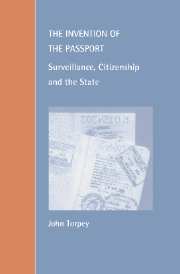Book contents
- Frontmatter
- Contents
- Acknowledgments
- Introduction
- 1 Coming and Going: On the State Monopolization of the Legitimate “Means of Movement”
- 2 “Argus of the Patrie”: The Passport Question in the French Revolution
- 3 Sweeping Out Augeas's Stable: The Nineteenth-Century Trend Toward Freedom of Movement
- 4 Toward the “Crustacean Type of Nation”: The Proliferation of Identification Documents From the Late Nineteenth Century to the First World War
- 5 From National to Postnational? Passports and Constraints on Movement from the Interwar to the Postwar Era
- Conclusion: A Typology of “Papers”
- Notes
- References
- Index
2 - “Argus of the Patrie”: The Passport Question in the French Revolution
Published online by Cambridge University Press: 24 August 2009
- Frontmatter
- Contents
- Acknowledgments
- Introduction
- 1 Coming and Going: On the State Monopolization of the Legitimate “Means of Movement”
- 2 “Argus of the Patrie”: The Passport Question in the French Revolution
- 3 Sweeping Out Augeas's Stable: The Nineteenth-Century Trend Toward Freedom of Movement
- 4 Toward the “Crustacean Type of Nation”: The Proliferation of Identification Documents From the Late Nineteenth Century to the First World War
- 5 From National to Postnational? Passports and Constraints on Movement from the Interwar to the Postwar Era
- Conclusion: A Typology of “Papers”
- Notes
- References
- Index
Summary
THE PASSPORT PROBLEM AT THE END OF THE OLD REGIME
In his recent history of the state built by the French revolutionaries, Isser Woloch has noted that “passports and certificates of residence [became] extremely important documents as conscription became a way of life,” and that “birth registers [were] the key to the whole process” of conscription, a process Woloch rightly regards as the revolutionaries' most significant, enduring, yet improbable institutional achievement. While Woloch is correct that the success of conscription depended on bureaucratic mechanisms designed to identify and regulate the movements of the citizenry, this approach to state administration would first have to overcome vigorous antipathy toward such means by many of the participants in the revolutionary project.
Passport controls, in particular, had been a vital mechanism of domination under the old regime in France, and were clearly regarded as such by those who made the revolution there in the late eighteenth century. Among the many restrictions to which the French revolutionaries objected was a 1669 edict of Louis XIV that had forbidden his subjects to leave the territory of France, as well as to related requirements that those quitting the Kingdom be in possession of a passport authorizing them to do so. In addition, commoners on the move within eighteenth-century France were technically required to have one of two documents: a passport issued by the town hall in the traveler's native village or the so-called aveu, an attestation of upright character from local religious authorities.
- Type
- Chapter
- Information
- The Invention of the PassportSurveillance, Citizenship and the State, pp. 21 - 56Publisher: Cambridge University PressPrint publication year: 1999



